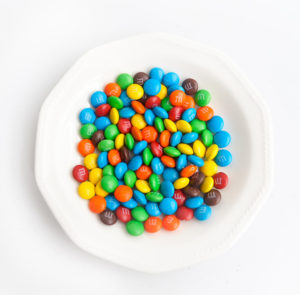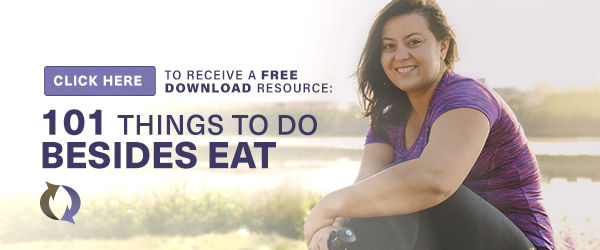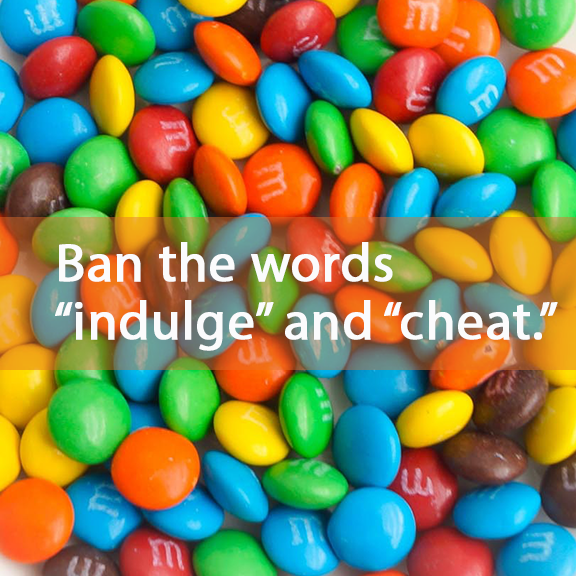A participant in one of my Am I Hungry? workshops said, “Those 100-calorie ice cream bars are really good! I ate four.” We all had a good laugh, then talked about how portion-controlled snacks and “guilt-free” treats often backfire.
Diet-culture promotes a rigid, guilt-inducing, good-food, bad-food approach to eating that often has exactly the opposite effect from what was intended. The “experts” tell you to substitute, earn, cheat, or indulge in order to eat what you love.
Most people underestimate the power food has over us when we are encouraged to deprive ourselves of foods we enjoy. Don’t underestimate the power of the words used to describe your eating!
A non-diet, mindfulness-based, weight-neutral approach teaches you to be the expert instead!
Words like “indulge” and “cheat” send the wrong message
We often hear diet-advice about “how to indulge in sweets and stay on your diet” that sounds like this:
 It’s OK to indulge yourself once in awhile.
It’s OK to indulge yourself once in awhile. - Exercise more so you can have a treat.
- Treat yourself every now and then.
- Don’t beat yourself up when you cheat; just start over.
- Plan a cheat day so you can eat what you want.
- Give in to your craving for chocolate with one small square every day.
- Eat dark chocolate instead; it’s better for you.
- Splurge on a special occasion then get right back on track.
- Substitute a guilt-free snack like fruit instead.
This seemingly permissive advice is loaded with restrictive messages!
Believing you are “indulging” in sweets can backfire!
Consider the underlying meaning and possible implications of the words used in the phrases above:
Indulge: spoiled, too lenient
Exercise more: earning, conditional
 Treat (noun): childish prize for being good
Treat (noun): childish prize for being good
Treat (verb): scarce reward
Cheat: sneaky, dishonest, deceptive, shameful, bad
Start over: this is a game, not a lifelong process
Give in: surrender, concede defeat, weakness
Better for you: justification, rationalization
Splurge: excessive, gluttonous
Back on track: eating what you love is “off track” and therefore bad
Substitute: you can’t eat what you love
Guilt-free: If you eat certain foods, you should feel guilty
Diet-y messages lead to paradoxical overeating and guilt
Even though some expert gave you “permission” to eat a limited amount of a favorite sweet like chocolate, these diet-y messages feed unconscious feelings of judgment and deprivation that may lead to paradoxical overeating.
The perception that you are “cheating” when you eat sweets makes it more difficult to stop once you start. Since “they” gave you an inch but you took a mile, you’ll feel out of control and guilty. This reinforces your belief (and theirs) that you need to be limited or even prohibited from “indulging” in your favorite “bad” foods.
Learn to trust your inner expert
Don’t allow external experts to set artificial and arbitrary boundaries around eating your favorite foods. Instead, learn to trust your internal expert to eat what you love and love what you eat.
Here are five mindful eating principles that help you learn to trust your inner expert:
 Awareness: Notice when you use diet-y words and phrases like those in the list above. Don’t judge or shame yourself. It’s a habit you’ve likely practiced for a long time, so it may take time to break the pattern.
Awareness: Notice when you use diet-y words and phrases like those in the list above. Don’t judge or shame yourself. It’s a habit you’ve likely practiced for a long time, so it may take time to break the pattern.- Curiosity: How often do you say or hear phrases like those above? How do you think or feel when you hear them? Does it help or make things worse?
- Nonjudgment: Instead of using judgmental words like “indulge” or “splurge,” just say “eat.” Don’t “cheat;” just choose. You take the power back when you simply choose to eat certain foods.
- The middle way: All foods can fit in a balanced diet. Let go of “good-food, bad-food” thinking.
- Compassion: When you feel physically uncomfortable after eating, don’t beat yourself up and add to the discomfort! Instead, be gentle with yourself and see what you can learn about the situation.
Learn more about a non-diet, mindfulness-based, weight-neutral approach that teaches you to be the expert instead!
This article is updated from a previous version.
If you enjoyed this article, here are three more to help you:
Got Cravings? Three Words to Eliminate from Your Vocabulary
Regret and Her Horrible Twin, Guilt



34 thoughts on “Ban the words “indulge” and “cheat””
Ugh. I hate the phrase “Back on track.” It’s almost as bad as “On/off the wagon.”
Although, I’m actually okay with “treat.” The word doesn’t make me think of scarcity or something childish, but of something out of the ordinary to be treasured.
Thanks for your insights Tamara – off the wagon is exactly what I’m talking about! I also love that a treat is something to be treasured – but should that really be out of the ordinary?
Michelle
Right on cue! On 2/16 the Dr. Oz show will air their 100th anniversary special. Below is a transcript sent in a press release about the show that shows exactly what I am talking about. Don’t get me wrong; I highly respect both of these men and their contributions to healthy lifestyles but they simply cannot see how their language is contributing to the very issues they hope to help!
Begin Press Release: Dr. Oz and Richard Simmons dieting vices
EMBED CODE CLIP TRANSCRIPT
DR. MEHMET OZ
I think another misperception that a lot of us have is that we can never cheat. We’re human beings. This what makes us so cool to study. So my weakness is one I’ve talked about, which is chocolate-covered nuts. No one ever send me them, ’cause I’ll go through boxes of them. Do you ever cheat and what do you cheat about?
RICHARD SIMMONS
Well, you know, I’m very hard on myself. And, you know, a sliver lives to a slab, lives to a slob. And that’s what I say to myself. You know, I’m from New Orleans, Louisiana. I grew up eating fried food. We would even take leaves off the ground and dip it in bread crumbs and eat them, you know? So, when anyone says fried, it’s like my afro starts to hump, you know, because I love, how many of you all love fried foods? (applause) (laugh)
End press release
My plea to both Mehmet Oz and Richard Simmons: PLEASE STOP contributing to the negative approach to eating. It doesn’t have to be this way.
Interesting view. I recently joined the Center for Mindful Eating and reading your article and I love everything you are saying.
I think there’s so much dietitians can learn about mindful eating. I wish I learned more about it in college.
The way I see it, sometimes we have the right intention but we fail to word it correctly. Instead of “Treat yourself every now and then.” maybe I should say, “it’s ok to eat some chocolate if you feel like it.” or maybe “if you enjoy the taste of dark chocolate,eat it…it’s a source of antioxidants your body would benefit from” instead of “Eat dark chocolate instead; it’s better for you. ” And if someone absolutely doesn’t like it, then there’s no reason why they should.
How do we do both: get the right message out but at the same time don’t confuse our clients and patients? I can’t bring myself to tell someone “you can eat chocolate when you feel like it.” What if they feel like it 5 times a day?
I find that people are constantly looking for an excuse to eat the foods they love. I always cringe when I hear, “You’re on vacation eat what you want” or “You worked hard you deserve to have X” or “You’re pregnant eat whatever you want.” It’s that mentality that we need an excuse to eat enjoyable foods.
I tell people to eat whatever they want every day ; )
Nour,
Thanks for you comments. I agree that there is so much to be learned and I too wish that health professionals learned about mindful eating during their training.
You are certainly right; even well-intentioned advice can backfire when there is an underlying restrictive message.
You concern, “I can’t bring myself to tell someone ‘you can eat chocolate when you feel like it.’ What if they feel like it 5 times a day?” is a common one.
However, it is fear-based. In truth, many people who have been deprived of chocolate and other foods they love, may overeat them at first (just like they do after a diet), but once they know those foods will never be forbidden again, the cravings decrease and the drive to overeat them diminishes. Will some people want chocolate everyday? Sure. But by eliminating the good-food-bad-food messages, it is possible to eat anything without eating everything. (The chapter on this in Eat What You Love, Love What You Eat is called “Fearless Eating” for a reason!)
You are so right Maryann – we don’t need an “excuse to eat enjoyable foods!” We live in an abundant food environment so there is always an “excuse.” Why not just make a decision to be in charge of what, when, and how much we eat?
Thanks for responding. Yes you are right. I tell people (and myself often) chocolate is not going away, Burger King will always be there, and you can always eat whatever you want tomorrow or later. It’s hard though to get people to think of “bad” foods in a different way. Sometimes people get frustrated if I don’t give them the label they are looking for: good vs. bad food!
This is definitely a topic I plan to read more about. Now that my 16-months old son is starting to ask for chocolate, I need to help him establish a healthy relationship. To be allowed to eat it but also encourage him to get an amount that satisfies him. At this age, they are way better than adults about stopping when full!
I saw a clip of your talks and I loved the going to the bathroom comparison! I have your book on my list of books to read!
Thanks!
Words have power… however what is beyond words has even more. However it takes trusting our inner self.
Nour, I hope you love the book! I think it will give you additional tools for sharing a message of no good vs. bad food.
Suzanna, I agree – it all boils down to trust.
Michelle,
I have to say I really apprecaite you posting this. All of the phrases you mentioned in the beginning sound positive, and seem like a good approach, but in the end they are limiting. Why should the foods we love be “limited” to only certain times/days? Unfortunately, it is the over-availability of the “not-so-good-for-you” food that also leads overconsumption. It a difficult task to teach the brain to listen to your body’s “Im full” or “Im satisfied” signals, when all your favorite foods are so easy to reach. That is why I also agree with the “fear-based” idea of telling people to have what they want. Sometimes, even with the best intentions… people tend to have more than is necessary – it’s in their face, everywhere they go! Food advertisements from posters to commercials… as well as the countless number of restaurants and fast-food options. In the end it comes down to really listening to yourself, and understanding and trusting ourselves… which obviously means that the real issue at hand goes WAY beyond the food itself! Again – thanks for the post!!
Great point Ariana. I wrote an article about that around Halloween with a theme of how to eat what you love when it is everywhere! http://www.eatwhatyoulovelovewhatyoueat.com/2009/10/the-trick-to-managing-the-treats-haunted-by-halloween-candy.html
I come from a different culture (Austria/Europe) and am amazed about the connotations that the above mentioned expressions seem to have for people of the US culture in general. To explain a little further, “Treat yourself now and then” appears to me as a pleasant reminder that us hardworking people need to make special moments other than the same old same old. As an example, it is a very rewarding and uplifting feeling to prepare a special meal with lots of chocolate for dessert, etc. Whereas in this discussion the underlying wish seems to be to please and to be productive at all times. This is a noble goal (not the “at all times” part, however), but it ends where pleasure and loving the moment just for itself and shouting prayers of thankfulness that there is something as delicious as chocolate, are becoming “wrong”, “secretive” and as if the wish for “treats” and for the “out of the ordinary” was something “bad”, like a broken piece of ourselves. There is a right time for everything in life. A time to achieve, to produce, to perform and a time to enjoy, treat yourself and splurge. How we perceive these words has a lot to do with the culture we live in.
Hi Michelle
Very interesting analysis of commonly used messages. I have a feeling that such “restrictive” language is used deliberately as a marketing tool to generate even more desire. I really like your scientific approach in analyzing these messages and words.
We have followed your advice with our son who loves chocolate. We rarely deny him chocolate when he asks for it. In the beginning he would ask for it all the time. But not anymore. In fact sometimes we even let him taste different types including dark chocolate. His twin sister on the other hand, doesn’t care about it at that much. Go figure!
Keep up the good work!
TwinToddlersDad, your children are wonderful examples of instinctive eating. As Sabine points out, our culture (including the culture of our own families) determines the meaning we give to words and food. You are brave and now gratified to see that we can trust our bodies (and children) to eat even their favorite fun foods in moderation when we don’t send the wrong messages.
I receive many articles via my email inbox and have ignored this one now for a few days. Today, as I am in a quite depressive/thoughts of self-harm, restrict/binge cycle I thought what the heck if I read it I can delete it thus clean up my inbox .
Reading about the “Chocolate Lover? ” and banning words like “indulge and treat” has opened my eyes just enough for now where I can view things in a more positive light at least for a few minutes. It somehow takes away some of the guilt. And for this moment right now, that is huge. Thank you!!!
Yes that it is huge Ellen! I’m so glad that you were encouraged by this article. Our website it full of free resources like this article to help you see your relationship with food differently. I hope that you are receiving counseling! Binge eating is treatable! We have recent study results showing that the majority of participants in our Mindful Eating for Binge Eating Program no longer qualify for a diagnosis of Binge Eating Disorder – even one year after treatment! https://amihungry.com/programs/mindful-eating-for-binge-eating/
Comments are closed.